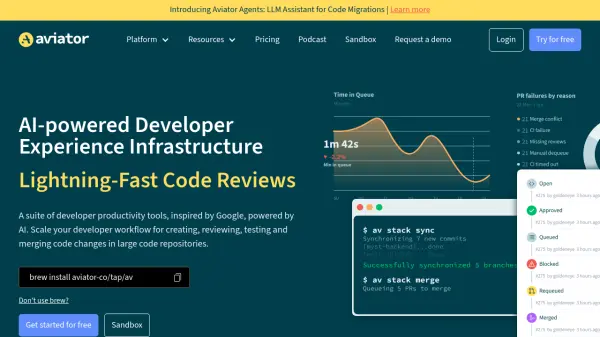What is Aviator?
Aviator provides a comprehensive developer experience platform leveraging AI to enhance productivity for engineering teams, particularly those managing large codebases or monorepos. It offers tools inspired by large tech companies to streamline the entire code lifecycle, from writing and reviewing to merging and deploying. The platform aims to address common challenges such as slow code reviews, flaky tests, and merge conflicts, ensuring smoother and faster development cycles for enhanced efficiency.
Key components include MergeQueue for managing pull request merges at scale, FlexReview Teams for optimizing code review processes, Stacked PRs for breaking down large changes, and a Releases dashboard for deployment management. Aviator integrates with existing CI/CD tools, source control systems like GitHub (including Enterprise), and supports various build tools, making it adaptable to different development environments. It also introduces Aviator Agents, an LLM-based framework for automating large-scale code migrations.
Features
- MergeQueue: Highly customizable merge queue to keep builds green at scale, supporting parallel queues, batching, and flaky test suppression.
- Stacked PRs: Open-source CLI to create, update, review, and merge stacked PRs on GitHub, enabling smaller, manageable code changes.
- FlexReview Teams: Flexible framework for faster code review cycles with automated rules, reviewer suggestions based on expertise, and SLO management.
- Releases Dashboard: Manage deploys, rollbacks, cherrypicks, and changelogs across environments.
- Aviator Agents: LLM-based agentic framework for performing large-scale code migrations.
- TestDeck Integration: Proactively detects and suppresses flaky tests (part of MergeQueue).
- AttentionSet: Tracks users expected to act on a PR for smoother review cycles.
- CI/CD Agnostic: Works with any build tool and CI platform.
Use Cases
- Scaling developer workflows in large code repositories or monorepos.
- Automating pull request merging to maintain build stability.
- Accelerating code review cycles without compromising security.
- Managing complex deployments, rollbacks, and cherrypicks across multiple environments.
- Breaking down large code changes into smaller, manageable stacked pull requests.
- Detecting and mitigating the impact of flaky tests on CI/CD pipelines.
- Automating large-scale code migrations using LLM agents.
- Improving collaboration and reducing delays in the code review process.
FAQs
-
How long does it take to set up Aviator?
Users typically are up and running in a few minutes, with potential fine-tuning needed depending on team size. Setup assistance is available. -
How is pricing determined?
Pricing is based on the number of active collaborators in the repository who have created a Pull Request and used Aviator on it. -
What is the difference between a collaborator and a user?
A collaborator is a GitHub user associated with the repository, while a user has access to the Aviator dashboard. Billing is based on active collaborators, not dashboard users. -
Can Aviator be deployed on-premise?
Yes, on-premise deployment options (docker-compose, k8s) are available for stricter security requirements. -
Does Aviator work with self-hosted GitHub Enterprise?
Yes, Aviator's on-premise installation supports self-hosted GitHub Enterprise.
Related Queries
Helpful for people in the following professions
Aviator Uptime Monitor
Average Uptime
99.86%
Average Response Time
193.17 ms
Featured Tools
Join Our Newsletter
Stay updated with the latest AI tools, news, and offers by subscribing to our weekly newsletter.











